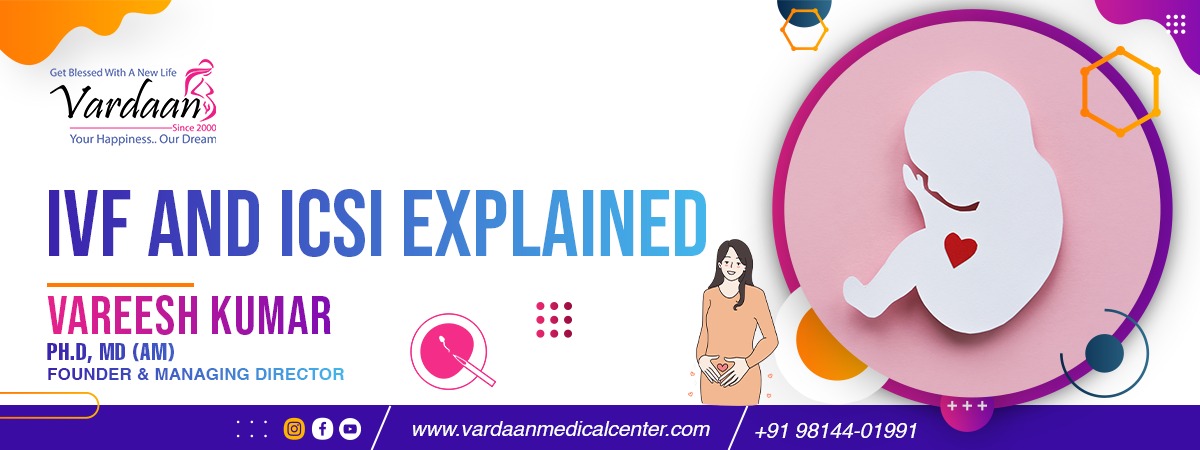A general overview of two kinds of assisted reproductive technology (ART) is provided on this page:
In-vitro Fertilization (IVF)
Intracytoplasmic sperm injection (ICSI).
IVF and ICSI are examples of assisted reproductive technology (ART) in which sperm and eggs are fertilized outside.
ICSI is utilized when there is a male cause of infertility, while IVF is used for female infertility and infertility that cannot be explained.
The procedures in IVF and ICSI therapy are as follows:
Hormone stimulation: A course of injectable fertility medications is used to stimulate the woman’s ovaries.
Retrieval of Eggs: When the eggs are ripe, they are removed from the lady while she is lightly sedated.
Embryo development: During IVF, the male partner’s or a donor’s sperm is introduced to the eggs to facilitate fertilization. When employing ICSI, the researcher picks up a single sperm and uses a minuscule needle to inject it into each egg. The embryos are then allowed to mature in the laboratory for 2 to 5 days (depending on clinic procedures).
Embryo transfer: If the eggs are fertilized and develop into embryos, one (or occasionally two) are transferred into the woman’s uterus. (When multiple embryos grow, they can be preserved and used in subsequent embryo transfers.)
Clinical Pregnancy: Test for clinical pregnancy two weeks after the embryo transfer: To determine whether the treatment was successful, the lady receives a blood test
Understanding the success rates of IVF and ICSI
Clinics use many methods to report success rates. Always compare like with like, or “apples
with apples,” when comparing the IVF and ICSI success rates of facilities. Most significantly,
while estimating your likelihood of becoming pregnant through IVF or ICSI, you must take
into account your own unique circumstances and medical background.
Health implications that IVF and ICSI may have
IVF and ICSI are safe treatments when performed by professionals, and medical issues are
infrequent. But like with other medical interventions, there are certain potential negative
effects to take into account for both adults receiving therapy and infants born as a result of
that treatment.
These Treatment are Recommended for
● Women with blocked or damaged fallopian tubes
● Women with ovulation disorders
● Women with endometriosis/Adenomyosis or severe pelvic adhesion
● Individuals with a genetic disorder
● Male factor infertility including decreased sperm count or sperm motility
● Unexplained infertility.
Success depend on
● Age
● Causes of infertility
Offerings of ICSI
ICSI treatment gives men who have very few sperm (oligospermia), no sperm (azoospermia)
in their semen but have undergone successful surgical sperm retrieval, or high numbers of
abnormal sperm that are unable to fertilize an egg, a chance to conceive a child with their
partner that is genetically theirs.
It also provides the potential to become pregnant for patients who use frozen sperm or who
have previously experienced a failed cycle due to low fertilization.
Complete Fertility offers IVF and ICSI.
Based on any necessary fertility studies, our knowledgeable fertility experts at Complete
Reproductive Centre will give you advice on the best fertility treatment for your
circumstances.
When is ICSI used?
ICSI is used if the sperm is unlikely to fertilize an egg naturally. This may be when:
• Sperm count is very low
• Sperm can’t move properly
• Sperm has a high rate of abnormality
• Sperm is retrieved directly from the epididymis (PESA) or the testicles (TESA), from the
urine, or by electro-ejaculation
• There are high levels of antibodies in the semen
• Previous IVF treatment has resulted in failed fertilization
• Sperm has been frozen
In IVF group, fertilization and implantation rates were significantly higher than ICSI group
(66.22% and 16.67% in IVF group versus 57.46% and 11.17% in ICSI group, respectively).


